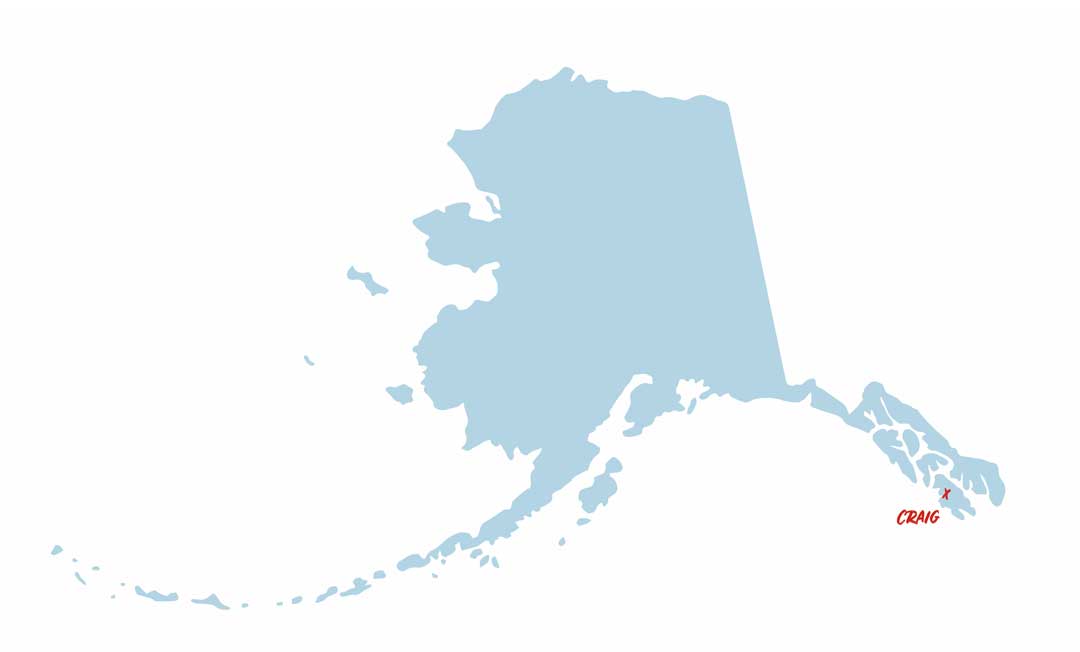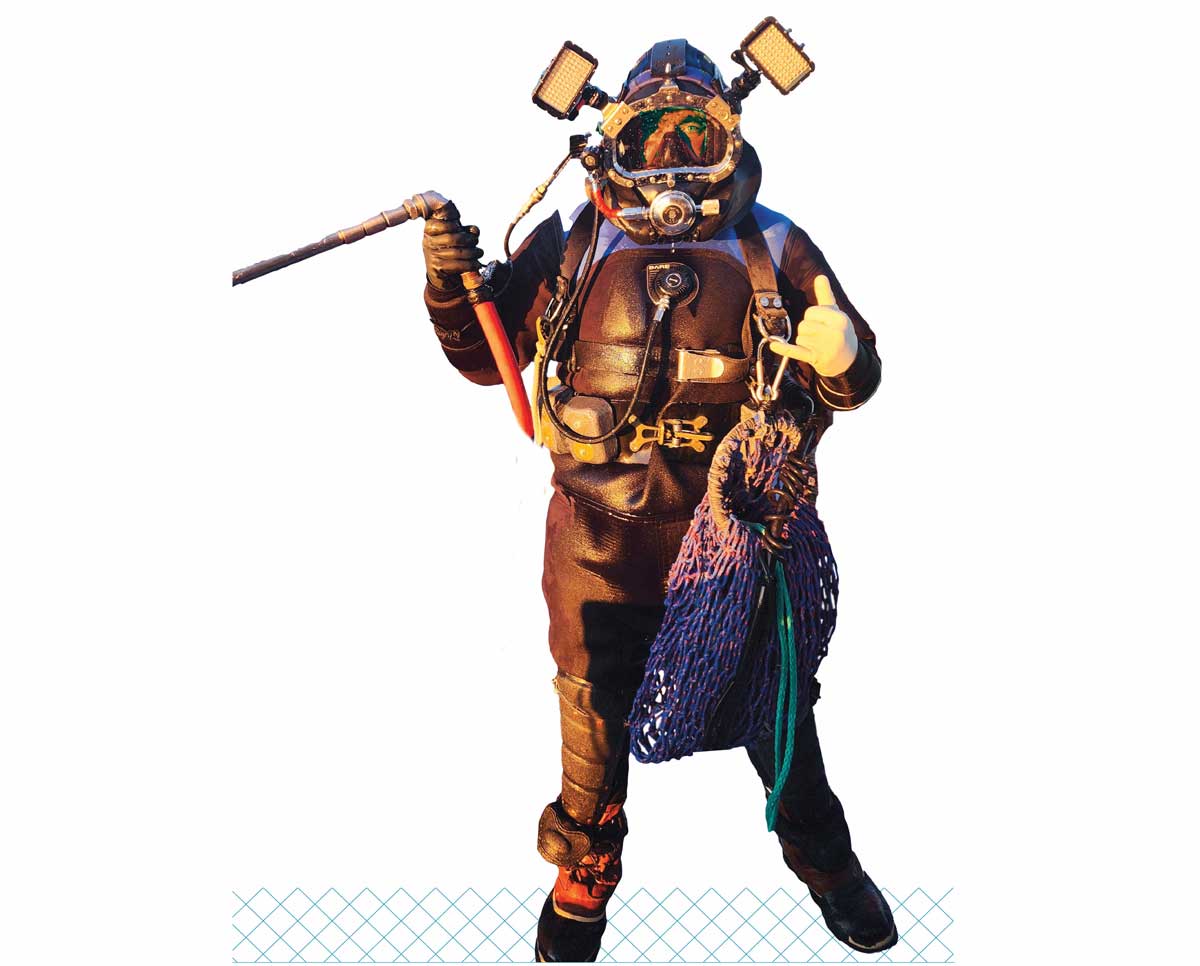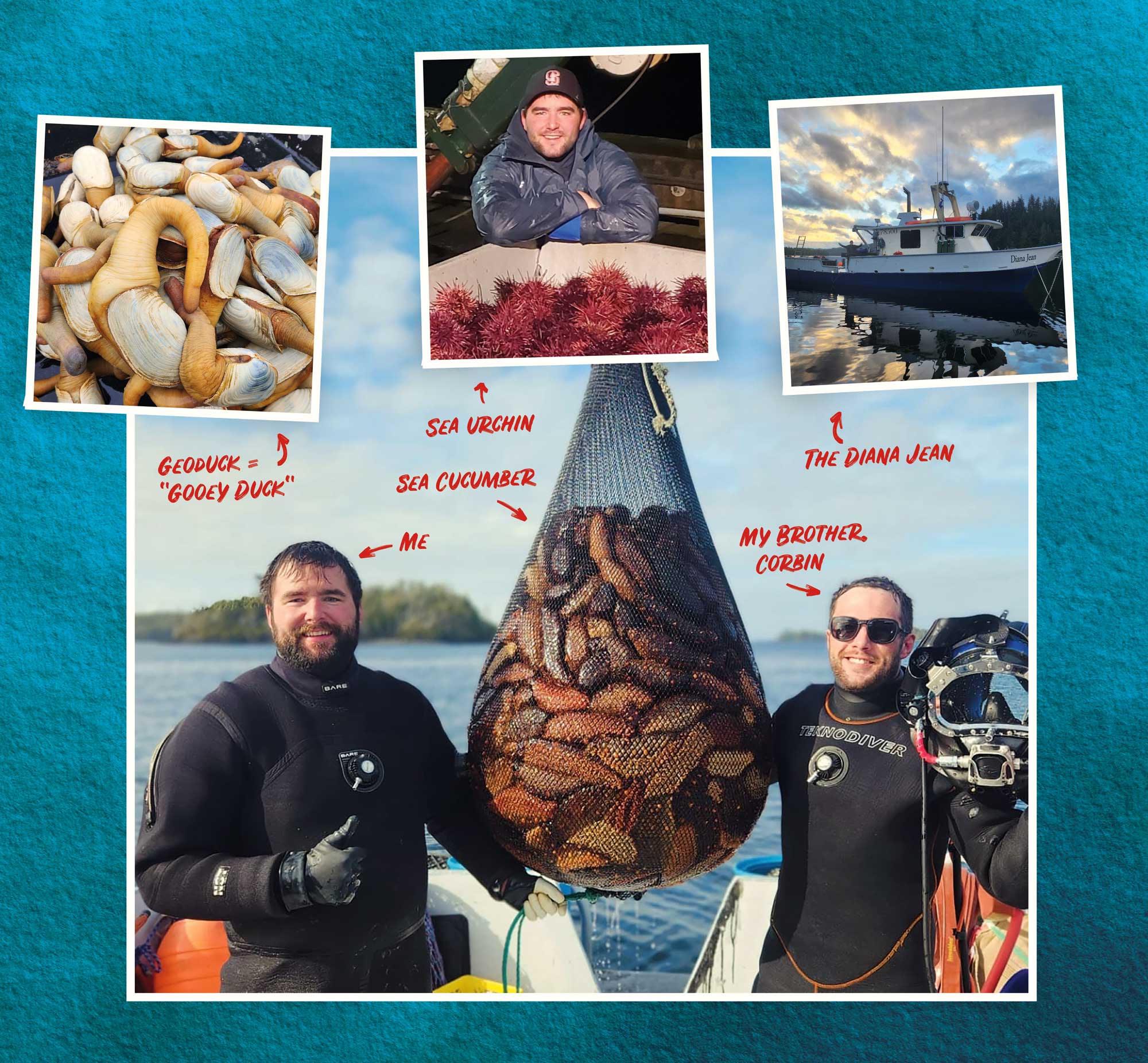Patrick Quigley’s workday began like any other, on the ocean floor in the Gulf of Alaska. The commercial fisherman was in Kasaan Bay, 50 miles from his hometown of Craig, alone in the frigid water, diving for sea cucumbers.
Only he wasn’t alone.
“I had half a bag of sea cucumbers, which is 150 pounds,” he says. As he tossed cukes into his bag, a pack of sea lions, curious and hungry, approached. “These things are 1,500 pounds. They have very similar skulls to grizzly bears,” he says. They’re also agile, reaching speeds of up to 30 miles per hour. They zipped by Quigley, the water in their wakes pushing him side to side. Using his scuba suit radio, he called up to his dive tender—in charge of keeping him safe from the boat—and learned that the sea lions, numbering 9 or 10 in all, were going up and down from the surface.

Quigley, ’14, was stuck. Racing up to his boat would give him the bends without necessarily keeping him safe from the sea lions. But down on the ocean floor, he was a sitting target. “I’m yelling at my freaking dive tender, like, ‘Do something!’”
“What the hell do you want me to do?” the tender yelled back.
There wasn’t time to figure that out. One sea lion broke from the pack and darted in. “I throw my bag in front of me, and it bites the bag,” says Quigley. The animal “starts jerking back and pulls me probably 10 or 15 feet, and I finally pop [the bag] just right, and it rips a hole.”
As soon as the sea lion realized the bag was full of sea cucumbers, it lost interest. While the slug-like creatures are a delicacy in East and Southeast Asia, sea lions, mercifully, don’t have the same opinion of them. With his heart pounding, Quigley tied a knot in the net to keep his catch from slipping out, then made his way back to the boat as quickly as he could.
Sea lions aren’t the only threat to Quigley’s livelihood, let alone his life. From his 55-foot boat, the Diana Jean, Quigley spends most of his working life jumping overboard to harvest his catch—mainly sea cucumber and the large burrowing clam known as geoduck—from the seafloor by hand. His boat has lost power in 18-foot seas and he’s been cut off from his air supply 50 feet below the surface.
But he loves it. “You’ve probably heard the term ‘flow state,’ right? For me, that is what diving is,” he says. “When I’m diving, I’m 100 percent there. There’s nothing else on my mind.”
Out of the blue
Quigley began helping out on his father’s boat as soon as he could walk. He spent his first full summer at sea when he was 2 years old, and later missed school to pitch in during the busy season, his alarm set for 3 a.m. to help his father pull in salmon. By the time he was 18, he wanted to be anything but a fisherman.
I’m getting out of Alaska. I’m never going to do this, he remembers thinking.
Yet there were early hints of his interest. By 11, Quigley was donning a scuba suit so he could swim under the hull of his dad’s boat to scrape off barnacles. Afterward, they’d head to the open water of the nearby bay, where his dad, Jim, would let him dive for fun. “That was my payment for doing the work dive that he didn’t really want to do,” says Quigley. In the kelp beds, with crystal clear waters and the creatures of Alaska all around him, Quigley got his first taste of that flow state. “I didn’t realize how rare that kind of moment is,” he says.
In 2010, Quigley left Craig (population 1,201) for Stanford (frosh population 1,674). He spent summers fishing for salmon to earn money for school, majored in public policy, and set his sights on becoming a lawyer. Before applying to law school, though, he took a year off to travel with his older brother, Corbin. They spent a few months fishing in Alaska to save up money, then decamped to New Zealand, walking nearly 2,000 miles across its length.
“It’s like, Well, shoot. This was a lot of fun. I might do this again,” says Quigley. And so he did, again, and again, and again, always with law school just beyond the horizon. For four years, he and his brother spent the spring and summer months fishing in Alaska, pulling in halibut, black cod, and salmon, and the fall and winter months chasing the sun in the Southern Hemisphere. Slowly, accidentally, fishing had become a choice rather than a chore.
In 2015, they were scuba diving in the Gulf of Thailand when a docile, spotted whale shark—an animal the size of a school bus—came within five feet of the group. The wonder unlocked a passion in Quigley. On his next trip, he spent seven months diving recreationally in every country in Central America. During his two-month stay in Honduras, he dove four or five times per day.
Wow, I really love doing this, he remembers thinking. How can I make this more of a career?
The answer was back in his hometown.
A sea change
Southeast Alaska has three main dive fisheries: sea cucumber, geoduck, and sea urchin. The creatures sit nearly motionless on the seafloor, so fishermen jump overboard in scuba gear to grab them one by one, like children at a competitive underwater Easter egg hunt. Quigley tried it the next chance he got.
“It is so much fun,” he says. “I fell in love with recreational diving, and then I got into [commercial diving], and it’s just like, Yes, this is so much better.” In 2017, he tossed the idea of law school overboard and decided to go all in as a dive fisherman. He needed money for the commercial permits—almost $200,000 in total—and for his own boat, so he fished year-round for the next five years, averaging between 285 and 320 days at sea per year.
Since 2022, he has focused on the dive fisheries, which are active from October to March. It’s not exactly a temperate workplace. “They’re out in the Gulf of Alaska, diving in the middle of winter,” says Kate Sullivan, the executive director of the Southeast Alaska Regional Dive Fisheries Association, where Quigley is vice president of the board. “We have huge tidal ranges, huge currents, huge water flows, big bodies of water.”

‘I’m not actually swimming when I’m diving. I’m wearing big Sorel hiking boots and catcher’s knee pads, and I have a hose attached to me.’
“I’m not actually swimming when I’m diving,” says Quigley, who has been known to venture out in minus-10-degree weather. “I’m wearing big Sorel hiking boots and catcher’s knee pads, and I have a hose attached to me.” All three fisheries require similar gear: a 7-millimeter-thick dry suit that keeps out the icy water, a long rubber air hose that connects divers to their oxygen supply on board, and a giant mesh bag that holds up to 300 pounds of catch. Flood lights attached to Quigley’s helmet help him see, and a 70-pound weight around his waist keeps him on the seafloor, up to 90 feet below the surface.
To keep species populations healthy, the state limits the number of days and hours each fisherman can dive, which means Quigley is always moving as fast as he can. “I don’t get wet because I wear a dry suit, but I’m soaked by the end of the day just from sweat,” he says. He especially loves the athleticism of sea cucumber diving. “It’s like a triathlon down there,” he says. He runs across the sand, scales 20-foot outcroppings, jumps off rocky ledges, and dashes through kelp beds while searching for the next patch of cucumbers.
“He’s a beast underwater,” says Corbin, who has been diving alongside him since the early days. The Quigley brothers are among the Alaska permit holders—about 150 for sea cucumber and 50 for geoduck—who hit their quota every week, catching the maximum amount allowed. “He works incredibly hard, and he’s really good at what he does,” says Corbin. “He’s intelligent enough to make the right calls and the right moves.”
Self-reliance and calm under pressure are essential, because beneath the fun is an undercurrent of risk. Most years, Quigley says, at least one diver in Southeast Alaska drowns. Air hose emergencies are especially common, and Quigley just went his first season without experiencing one. A wrong turn underwater or a strong current creates a kink in the thick, rubber hose, or moist, frigid air freezes inside of it. When the oxygen cuts off, Quigley says it’s like putting your lips inside an empty cup and inhaling to suction it to your mouth, except that feeling encompasses his head as his ears pop and he sucks every ounce of air out of his mask.
He always carries a 20-cubic-liter bailout tank on his back that buys him time to ascend, but the ocean is creative when it comes to danger. Fortunately, most of Quigley’s coworkers are more courteous than a certain gang of sea lions. Ducks sometimes dive into the water alongside him. Octopuses like to follow him and grab the scraps he leaves behind. So do flounders, lingcod, and snapper. And while sea lions lack some tact, he loves when their pups stop by. In diving down to get food for people, he’s both witness to and participant in a small ecosystem of wildlife. He enjoys the front-row seat.
“It’s the most beautiful office in the world, right?” he says. “You’re out in total wilderness—orcas and humpbacks and eagles, and everything is just gorgeous.” He now hopes to fish for the rest of his life. While he may not push himself quite as hard as he gets older, he says, his ideal retirement doesn’t look much different than his life does now.
With his permits paid off, Quigley is back to traveling several months a year, and while he still enjoys it, he also has a newfound appreciation for Craig. “We call it our Alaska vacations even though we live in Alaska,” he says. When Quigley’s not fishing, he and his wife, Melissa Peavey, a fellow Craig native, like to go hiking, power boating, and camping. “I’m a small-town kind of guy,” he says, “but I didn’t know that when I had only been in small towns.”
Kali Shiloh is a staff writer at Stanford. Email her at kshiloh@stanford.edu.
Photographs courtesy Patrick Quigley



